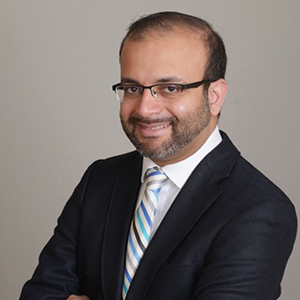Conversations With Cardiologists: Mirza Umair Khalid, MD, FACC

Mirza Umair Khalid, MD, FACC, is an assistant professor at Baylor College of Medicine, where he also serves as academic director of the cardiovascular disease fellowship program and medical director of the CCU at the Michael DeBakey VA Medical Center. He completed his MBBS at Aga Khan University. He then completed his residency in internal medicine, as well as cardiovascular disease and interventional cardiology fellowships at Baylor College of Medicine. Khalid is a past member of ACC's Early Career Leadership Council and chaired ACC's Early Career Social Media Work Group.
How did you first get involved with ACC's Early Career Section, and what has the journey looked like thus far?
I was fortunate to have great mentors throughout my training; from medical school all the way to cardiology fellowship. I believe mentorship plays a vital role even after completion of training. My current mentor, Ali E. Denktas, MD, FACC, often says a cardiologist learns the most during the first 12 months as an attending, which is when they make decisions independently for the first time. My mentors guided me to my involvement with the ACC throughout the years. Even during fellowship, I applied to ACC's committees and got to know ACC leadership at the national level. I also participated in activities at ACC's Texas Chapter during the past few years. At the same time, I have strived to grow clinically. Overall, the journey has been very satisfying with a good work-life balance.
What advice do you have for fellows who want to get involved with ACC's Early Career Section?
Every year around the fall, there is an opportunity to apply for ACC committees. There are around 90 committees. Try to apply to as many as possible. If you do not get into any, do not lose hope and keep applying every year. I did not get into any committees when I first applied as a Fellow in Training (FIT).
I strongly encourage FITs to check out ACC's Early Career/FIT on-demand webinars, which include key topics such as research, career advice, the business aspect of medicine, social media, personal growth, advocacy and more. These are recordings of webinars over the past few years by ACC leadership to guide early career professionals and FITs.
I also encourage FITs to try and attend the annual conference both at local chapters and national ACC. Try to get involved with ACC activities, such as presenting abstracts and participating in FIT Jeopardy. This also allows FITs to connect with each other as well as ACC leaders locally and nationally.
What advice do you have for early career faculty who want to get involved with the ACC and ACC's Early Career Section?
The ACC has plenty of resources for early career professionals. I would specifically like to mention the Early Career Section work groups. These include the publications work group, editorial work group, social media work group, education work group and more. Each of these work groups are led by ACC Early Career Leadership Council members, and there are always opportunities for early career professionals to get involved.
I believe it important to be involved in ACC activities because it helps with networking and staying current in cardiology. All early career professionals should also apply for Fellow of the ACC (FACC) to get the maximum benefits out of being part of the ACC.
This article was authored by Ravi Thakker, MD, a cardiovascular disease fellow at The University of Texas Medical Branch.
Twitter: @rthakker92
This content was developed independently from the content developed for ACC.org. This content was not reviewed by the American College of Cardiology (ACC) for medical accuracy and the content is provided on an "as is" basis. Inclusion on ACC.org does not constitute a guarantee or endorsement by the ACC and ACC makes no warranty that the content is accurate, complete or error-free. The content is not a substitute for personalized medical advice and is not intended to be used as the sole basis for making individualized medical or health-related decisions. Statements or opinions expressed in this content reflect the views of the authors and do not reflect the official policy of ACC.